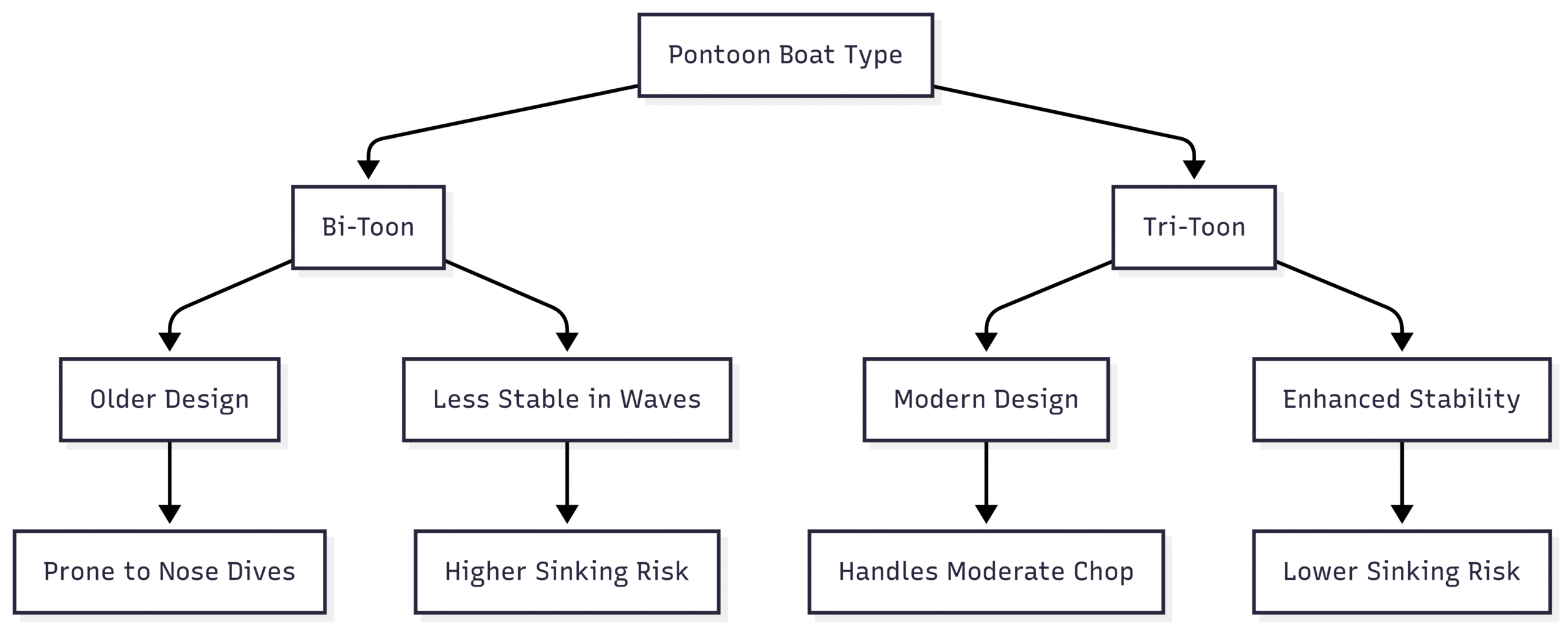Can Pontoon Boats Sink? Here’s the Answer
Can pontoon boats sink? Explore why pontoons are safe, how sinking occurs, and tips to prevent it in this comprehensive guide.
Pontoon boats, often dubbed the “SUVs of the water,” are beloved for their spacious decks, stability, and versatility. Whether cruising on a calm lake or hosting a family gathering on a river, these vessels offer a comfortable boating experience. However, a question lingers among novice and seasoned boaters alike: Can pontoon boats sink? The short answer is yes, but the likelihood is low due to their design and safety features. This article delves into the mechanics of pontoon boats, the rare circumstances under which they can sink, and practical steps to ensure they stay afloat.
Understanding Pontoon Boat Design
Pontoon boats derive their buoyancy from cylindrical, air-filled tubes called pontoons, typically made of aluminum. These pontoons, often two or three in number (bi-toons or tri-toons), provide the lift needed to keep the boat afloat. Modern pontoons are divided into multiple watertight compartments, or baffles, which enhance safety by limiting water ingress if one section is damaged.
Key Design Features
- Multiple Chambers: Each pontoon contains several sealed compartments. If one is punctured, the others maintain buoyancy, preventing total submersion.
- Stable Platform: The wide, flat deck distributes weight evenly, reducing the risk of capsizing compared to V-hull boats.
- Material Strength: High-grade aluminum, often thicker in modern designs, resists corrosion and damage.
- Tri-Toon Advantage: Tri-toon models, with a third central pontoon, offer superior stability and weight capacity, making them less prone to sinking in rough conditions.
Evolution of Pontoon Boats
Over the past two decades, pontoon boats have undergone significant advancements. Gone are the days of basic floating decks with minimal amenities. Today’s models boast sleek exteriors, advanced electronics, and powerful outboard engines, some exceeding 600 horsepower. These upgrades have transformed pontoons into high-performance vessels capable of handling diverse water conditions, from tranquil lakes to choppy rivers.
Can Pontoon Boats Sink? The Truth
Yes, pontoon boats can sink, but it’s rare. Sinking occurs when water enters the pontoons, compromising their buoyancy. Unlike traditional hull boats, which displace water and can fill with it, pontoons rely on air-filled tubes. For a pontoon boat to sink, these tubes must be significantly damaged or filled with water, a scenario that requires extreme conditions or user error.
Real-Life Incident
Consider a personal account from a boater on an older bi-toon pontoon. The owner neglected to secure the pontoon plugs before launching, allowing water to seep into both tubes during a lake crossing. The boat gradually sank, but nearby help ensured the passengers’ safety. This incident underscores the importance of pre-launch checks, especially on older models with drain plugs.
Causes of Pontoon Boat Sinking
Several factors can lead to a pontoon boat sinking, though most are preventable with proper care and operation.
1. Pontoon Damage and Leaks
- Punctures or Cracks: Collisions with underwater obstructions, such as rocks or sunken debris, can tear the aluminum pontoons. If the damage breaches multiple chambers, water ingress can cause the boat to list or sink.
- Corrosion: Older pontoons may develop leaks due to corrosion, especially if not maintained properly.
- Loose Plugs: Some older models have drain plugs that, if not secured, allow water to enter the pontoons.
2. Overloading
Exceeding the boat’s weight capacity destabilizes it, lowering the deck closer to the waterline. In rough conditions, waves can wash over the deck, increasing the risk of sinking if the bilge pumps can’t keep up. Manufacturers clearly label weight capacities, typically ranging from 1,500 to 3,500 pounds, depending on the model.
3. Rough Water
Pontoon boats are designed for inland waters like lakes, rivers, and intracoastal waterways. While they can handle moderate chop, extreme waves or storms can overwhelm them. A “nose dive,” where the bow dips into a wave, can flood the deck. Though this rarely sinks the boat, it can be alarming and damage onboard items.
4. User Error
Inexperienced operators may inadvertently cause damage by:
- Navigating shallow waters without a depth finder.
- Ignoring weather forecasts and venturing into stormy conditions.
- Failing to inspect the boat for leaks or damage before launching.
Safety Features That Prevent Sinking
Pontoon boats are engineered with safety in mind, incorporating features that minimize the risk of sinking.
| Feature | Description | Benefit |
|---|---|---|
| Multiple Chambers | Pontoons are divided into 4–8 watertight compartments. | Limits water ingress to a single chamber, maintaining overall buoyancy. |
| Bilge Pumps | Automatically remove water from the deck. | Prevents water accumulation during heavy rain or wave washovers. |
| Lifting Strakes | Metal strips along pontoons that improve lift and reduce drag. | Enhances stability and performance in choppy water. |
| Pressure Testing | Manufacturers like Barletta test pontoons for leaks during production. | Ensures no factory defects compromise buoyancy. |
| Foam Flotation (U-Toons) | Older U-shaped pontoons are filled with foam for added buoyancy. | Reduces sinking risk, though less common in modern designs. |
Manufacturer Spotlight: Barletta’s Safety Standards
Barletta Pontoon Boats exemplifies modern craftsmanship. Their pontoons undergo rigorous pressure testing using Schrader valves and a soapy solution to detect leaks. Baffles create watertight compartments, ensuring that a puncture in one section doesn’t flood the entire tube. These measures make Barletta’s boats among the safest in the industry.
Preventing Pontoon Boat Sinking: Best Practices
Preventing a pontoon boat from sinking boils down to preparation, maintenance, and safe operation. Here’s how to stay afloat:
1. Regular Inspections
- Pre-Launch Checklist:
- Inspect pontoons for dents, cracks, or corrosion.
- Ensure drain plugs (if present) are secure.
- Test bilge pumps and navigation equipment.
- Post-Trip Checks: After each outing, examine the pontoons for new damage, especially if you navigated unfamiliar waters.
2. Adhere to Weight Capacity
- Check the manufacturer’s weight capacity label, usually located near the helm.
- Account for passengers, gear, and fuel when calculating total weight.
- Distribute weight evenly to maintain stability.
3. Safe Operation
- Weather Awareness: Monitor forecasts and avoid boating in storms or high winds.
- Wave Management: Take waves at an angle (“on the beam”) rather than head-on to prevent nose dives.
- Local Knowledge: Consult local boaters or use depth finders to avoid underwater hazards like sunken barges or shallow shoals.
4. Proper Maintenance
- Clean pontoons regularly to prevent corrosion.
- Service bilge pumps and engines annually.
- Store the boat on a lift or trailer to minimize water exposure when not in use.
5. Boater Education
- Enroll in a boater’s education course, available through organizations like the U.S. Coast Guard Auxiliary.
- Learn from local dealers or marinas, who often offer hands-on training tailored to your waterway.
Pontoon Boats in Rough Water: Myth vs. Reality
A common misconception is that pontoon boats can’t handle rough water. While they’re not built for offshore adventures, modern tri-toons with lifting strakes and powerful engines can manage choppy inland waters effectively. A boater recounted navigating a tri-toon through busy lake traffic, where waves caused a wet deck but no sinking. Older bi-toons, however, are more prone to nose dives, as illustrated by a Michigan incident where a pontoon took on water after hitting swells head-on in Lake Michigan.
Chart: Pontoon Boat Stability in Rough Water

This chart illustrates how tri-toons outperform bi-toons in rough water due to their design advancements.
Pontoon Boat Specifications and Pricing
To understand pontoon boat safety, consider their specifications. Below is a table comparing popular models, highlighting features that influence stability and buoyancy.
| Model | Length | Pontoon Type | Weight Capacity | Horsepower | Price (USD) |
|---|---|---|---|---|---|
| Barletta Lusso 25UC | 25 ft | Tri-Toon | 2,800 lbs | Up to 400 HP | $80,000–$120,000 |
| Starcraft EXS 23 | 23 ft | Tri-Toon | 2,600 lbs | Up to 200 HP | $50,000–$75,000 |
| Sun Tracker Party Barge 22 | 22 ft | Bi-Toon | 2,200 lbs | Up to 150 HP | $30,000–$50,000 |
| Bennington 23 LSB | 23 ft | Tri-Toon | 2,700 lbs | Up to 250 HP | $60,000–$90,000 |
Note: Prices vary based on customization, engine size, and dealer location. Tri-toons generally cost more due to their enhanced stability and performance.
Are Pontoon Boats Right for You?
Pontoon boats are ideal for recreational boating, offering a “floating living room” experience. Their safety features make them popular for rentals and family outings, requiring minimal skill to operate. However, they’re best suited for inland waters, not open seas or Great Lakes, where V-hull boats excel.
Pros
- Spacious and comfortable for large groups.
- Highly stable, reducing capsizing risk.
- Easy to operate, even for beginners.
- Modern models offer high speed and luxury amenities.
Cons
- Limited to inland waters; not ocean-worthy.
- Older models may be less stable in rough conditions.
- Maintenance required to prevent corrosion or leaks.
Community Insights: Boaters’ Perspectives
Online forums reveal a consensus among boaters: pontoon sinking is rare but possible. One user noted, “You’d have to whack something hard to breach all chambers.” Another shared a story of a pontoon surviving a fire and wreck, only partially submerging. These anecdotes reinforce the resilience of pontoon boats when properly maintained.
Conclusion: Stay Afloat with Smart Boating
Pontoon boats are among the safest recreational vessels, thanks to their buoyant design and safety features. While they can sink if pontoons are severely damaged or overloaded, such incidents are uncommon. By conducting regular inspections, respecting weight limits, navigating wisely, and maintaining the boat, you can enjoy worry-free adventures. Whether you’re a first-time boater or a seasoned captain, pontoon boats offer a reliable, family-friendly experience—provided you prioritize safety.
For those considering a pontoon purchase, brands like Barletta and Starcraft offer models with cutting-edge safety features. Equip yourself with knowledge, and your pontoon will remain a floating haven for years to come.
Share Can Pontoon Boats Sink with your friends and Leave a comment below with your thoughts.
Read Can Pontoon Boats Go in the Ocean? until we meet in the next article.






